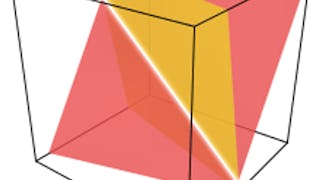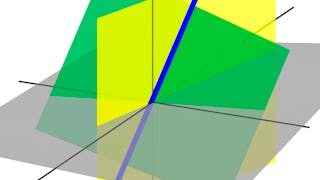This course is all about matrices, and concisely covers the linear algebra that an engineer should know. The mathematics in this course is presented at the level of an advanced high school student, but it is recommended that students take this course after completing a university-level single variable calculus course, such as the Coursera offering Calculus for Engineers. There are no derivatives or integrals involved, but students are expected to have a basic level of mathematical maturity. Despite this, anyone interested in learning the basics of matrix algebra is welcome to join.



Matrix Algebra for Engineers
This course is part of Mathematics for Engineers Specialization

Instructor: Jeffrey R. Chasnov
Top Instructor
111,440 already enrolled
Included with 
(4,534 reviews)
Recommended experience
What you'll learn
Matrix multiplication, transpose, inverse, orthogonal matrices
Gaussian elimination, reduced row echelon form, LU decomposition
Vector Spaces, linear independence, Gram-Schmidt process, null space, column space, least-squares problem
Determinants, Laplace expansion, Leibniz formula, eigenvalue problem, matrix diagonalization, powers of a matrix
Skills you'll gain
Details to know

Add to your LinkedIn profile
17 assignments
See how employees at top companies are mastering in-demand skills

Build your subject-matter expertise
- Learn new concepts from industry experts
- Gain a foundational understanding of a subject or tool
- Develop job-relevant skills with hands-on projects
- Earn a shareable career certificate


Earn a career certificate
Add this credential to your LinkedIn profile, resume, or CV
Share it on social media and in your performance review

There are 4 modules in this course
Matrices are rectangular arrays of numbers, symbols, or expressions, arranged in rows and columns. We define matrices and show how to add and multiply them, define some special matrices such as the identity matrix and the zero matrix, learn about the transpose and inverse of a matrix, and discuss orthogonal and permutation matrices.
What's included
10 videos26 readings5 assignments
A system of linear equations can be written in matrix form, and can be solved using Gaussian elimination. We learn how to bring a matrix to reduced row echelon form, which can be used to compute the matrix inverse. We also learn how to find the LU decomposition of a matrix, and how this decomposition can be used to efficiently solve a system of linear equations with changing right-hand sides.
What's included
7 videos6 readings3 assignments
A vector space consists of a set of vectors and a set of scalars that is closed under vector addition and scalar multiplication and that satisfies the usual rules of arithmetic. We learn some of the vocabulary and phrases of linear algebra, such as linear independence, span, basis and dimension. We learn about the four fundamental subspaces of a matrix, the Gram-Schmidt process, orthogonal projection, and the matrix formulation of the least-squares problem of drawing a straight line to fit noisy data.
What's included
13 videos14 readings5 assignments
An eigenvector of a matrix is a nonzero column vector that when multiplied by the matrix is only multiplied by a scalar (called the eigenvalue). We learn about the eigenvalue problem and how to use determinants to find the eigenvalues of a matrix. We learn how to compute determinants using the Laplace expansion, the Leibniz formula, and by row or column elimination. We also learn how to diagonalize a matrix using its eigenvalues and eigenvectors, and how this can be used to easily calculate a matrix raised to a power.
What's included
13 videos20 readings4 assignments
Instructor

Top Instructor
Explore more from Math and Logic


Johns Hopkins University


Johns Hopkins University


The University of Sydney


DeepLearning.AI
Why people choose Coursera for their career




Learner reviews
4,534 reviews
- 5 stars
87.80%
- 4 stars
10.56%
- 3 stars
1.12%
- 2 stars
0.19%
- 1 star
0.30%
Showing 3 of 4534
Reviewed on Apr 16, 2022
I found the explanations of prof Chesnoff very simple and informative. I understood much better the concepts of eigenvalues and vector spaces after chesnoffs' explanations!!!Thanks
Reviewed on Nov 8, 2024
I found the explanations of prof Chesnoff very simple and informative. I understood much better the concepts of eigenvalues and vector spaces after chesnoffs' explanations!!!
Thank you
Reviewed on Jan 14, 2023
Previously to some extent I studied matrix algebra as a part of other math topics. I found this course a concise and very helpful review. Some methods introduced are life-saving.

Open new doors with Coursera Plus
Unlimited access to 10,000+ world-class courses, hands-on projects, and job-ready certificate programs - all included in your subscription
Advance your career with an online degree
Earn a degree from world-class universities - 100% online
Join over 3,400 global companies that choose Coursera for Business
Upskill your employees to excel in the digital economy
Frequently asked questions
Access to lectures and assignments depends on your type of enrollment. If you take a course in audit mode, you will be able to see most course materials for free. To access graded assignments and to earn a Certificate, you will need to purchase the Certificate experience, during or after your audit. If you don't see the audit option:
The course may not offer an audit option. You can try a Free Trial instead, or apply for Financial Aid.
The course may offer 'Full Course, No Certificate' instead. This option lets you see all course materials, submit required assessments, and get a final grade. This also means that you will not be able to purchase a Certificate experience.
When you enroll in the course, you get access to all of the courses in the Specialization, and you earn a certificate when you complete the work. Your electronic Certificate will be added to your Accomplishments page - from there, you can print your Certificate or add it to your LinkedIn profile. If you only want to read and view the course content, you can audit the course for free.
If you subscribed, you get a 7-day free trial during which you can cancel at no penalty. After that, we don’t give refunds, but you can cancel your subscription at any time. See our full refund policy.
More questions
Financial aid available,

